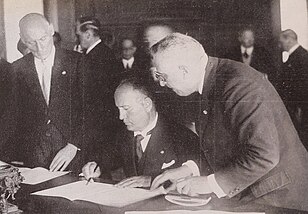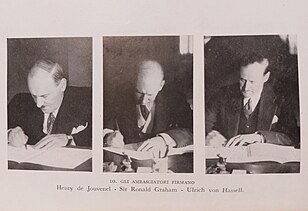Four-Power Pact
The Four-Power Pact, also known as the Quadripartite Agreement, was an international treaty among the United Kingdom, France, Italy, and Germany that was initialled on 7 June 1933 and signed on 15 July 1933 in the Palazzo Venezia, Rome.
The Pact was not ratified by the French Parliament.

Background
The creator and chief promoter of the pact was Benito Mussolini, who completed its original manuscript during one of his short stays at Rocca delle Caminate, in March 1933. Against the backdrop of the Great Depression and the Nazi rise to power, Mussolini called for the creation of the Four-Power Pact on 19 March 1933 as a better means of ensuring international security. Under the plan, smaller nations would have less of a voice in great power politics. Representatives of the United Kingdom, France, Germany and Italy signed a diluted version of Mussolini's Four-Power Pact proposal.
Mussolini's chief motive in suggesting the pact was his wish for closer relations with France. Though Mussolini's purpose may have been to calm Europe's nerves, the pact actually caused the opposite result. It reaffirmed each country's adherence to the Covenant of the League of Nations, the Locarno Treaties and the Kellogg-Briand Pact.
The pact was intended to be the solution to the issue of sovereign powers coming together and operate in an orderly way, which had been the purpose of the League of Nations. Mussolini's goal was to reduce the power of the small states in the League of Nations by a bloc of major powers.
The Four-Power Pact had little significance but was not completely devoid of merit. The Four-Power Pact was supposed to be a solution to the exploitation of the balance of power, which was of interest to Italy and also appealed to the British.
However, the pact faced speculation in France and Germany. Since London and Rome were close enough to mediate between Paris and Berlin, France was justifiably alarmed.
Negotiation, initialing and signing
The pact was ultimately supported by all the four great powers, as well as other states. MacDonald was the first to come to Italy to discuss the pact, anticipating Mussolini, according to Salata, evidently informed of the Duce's idea. France ultimately approved the pact, and in April 1933 Daladier and Paul-Boncour expressed their support for the continuation of negotiations of the pact. Likewise, the Grand Council of Fascism gave its strong support to the "action of the head of the Fascist government." In April 1933 Rome was informed that Belgium hailed Mussolini's idea of a pact among the four powers, only pointing out that it expected to be included in the discussions when these touched upon Belgium's interests, especially when discussing the colonies in Africa, receiving assurances from Italy in this regard. In the same month von Papen hailed the "genial idea of Mussolini", while Hitler, in his 17 May speech, reiterated his support and approval of the pact.
The Pentecost incident
During the negotiations occurred what came to be known as the "Pentecost incident". When it was thought that the four powers had reached an agreement, with the 31 May issue of the Times even giving for granted the publication of the pact for the following day, it turned out that France had agreed by negotiating on a previous version of the treaty, different from those considered at the moment by the other countries, and everything had to be started over again. The last text, which was thought to have been approved by everyone, was not known in Paris, from which the French government had negotiated on the basis of a different text. The text on whose basis the French were negotiating was a previous version, proposed by the French themselves. The telephone, which had substituted letters and telegrams in the last part of the negotiations, was deemed responsible; further, suspicions of a scheme were raised. The French ambassador de Jouvenel, a strong supporter of Mussolini's pact, took the blame on himself, adding that any mistakes must have happened in good faith. The negotiations had quickened in the last days, after having been very sluggish in the beginning. Salata notes that the "modern tools had played a bad trick". He further notes that the extensive use of the telephone in the last part of the negotiations will make it difficult for future historians of the Four-Power Pact, who won't find written documents for all phases of this negotiation.
Initials and signature
The difference between the texts, and the root of the disagreement, was linked to the article three of the proposed Pact, which had to do with the question of the disarmament, which especially interested Germany. After the Pentecost incident, the French then proposed to simply suppress the article 3, an idea which was immediately rejected by the other powers. Eventually the four great powers agreed on an apparently more generic version of the article 3, proposed by the British, and close to the original draft by Mussolini.
At half past five PM, after the consent from Berlin, the four powers agreed on initialling the pact. Mussolini then reached Palazzo Madama, where he pronounced to the senate his speech regarding the pact, whose central part he had composed in the past few days, retouching it till the last moment, perhaps even during his trip to Palazzo Madama. His speech was warmly praised, with Salata calling it the greatest speech ever pronounced by any Italian head of state or minister, and the greatest interpretation of the "feelings and life's purpose of the others and of the universality". After Mussoloini's speech at the senate, the pact was initialed at Palazzo Venezia at half past seven in the evening that same day.
The pact would eventually be signed on 15 July in Palazzo Venezia. In the protocol of the initials it was agreed that, whatever the day of the signature, the pact would bear the date of 7 June 1933, an expressive act of the will of the governments.
Outcome
The document that was signed bore little resemblance to the initial proposal. In practice, the Four-Power Pact proved of little significance in international affairs, but it was one of the factors contributing to the German-Polish Non-Aggression Pact of 1934.
It has been argued that the Four-Power Pact could have safeguarded the European balance of power with the hope of balancing peace and security in Europe. However, the Great Depression was abundant in Europe, and the rise of Hitler to power also makes the idea unlikely. Poland's reliance on France had been weakened, and differing attitudes emerged of the pact between Poland and Czechoslovakia. Opposition to the revision of the Four-Power Pact was expressed by Poland and the Little Entente, as apparent in the French dilution of the pact in this final form. It is apparent that the Four-Power pact had a negative impact of France's allies in Central and Eastern Europe.
Role of Hitler
The rise of Adolf Hitler to power was an adequate reason to propose alternative power arrangements. However, what had started as an alternative to the League of Nations ended as a reassertion of devotion to that failing institution. Hitler was willing to accept the gratuitous triumph of the League of Nation's death. The pact soon failed, but the United Kingdom, in particular, did not easily throw away the Pact's idea. Germany's withdrawal from the League put the Pact on hold.
The Pact had major impact on modern law[citation needed]. For six years, the United Kingdom would make vain attempts to make it work at nearly any cost, but the failure of the Four-Power Pact served as a warning of Germany's continued withdrawal from diplomatic relations with France and the United Kingdom in the buildup to the Second World War.[citation needed]
Literature
- Francesco Salata: Il patto Mussolini, Milan, Mondadori, 1933.
Gallery
- Simon, MacDonald, Mussolini at the British Embassy in Rome on 19 March 1933
- Mussolini initialling the Four-Power Pact on 7 June 1933
- Hassel, Mussolini, Graham, and de Jouvenel after the initialling of the pact, 7 June 1933
- Mussolini and the ambassadors at Palazzo Venezia, after the signing of the pact, 15 July 1933
Notes
References
Sources
- Salata, Francesco (1933). Il patto Mussolini. Mondadori.
- Jarausch, Konrad Hugo (January 1967). "The Four-Power Pact, 1933". The American Historical Review. 72 (2). Oxford University Press: 571–572. doi:10.2307/1859293. JSTOR 1859293.
- Zbigniew, Mazur (October 1981). "Pakt Czterech". The American Historical Review. 86 (4). Oxford University Press: 880. doi:10.2307/1860241. JSTOR 1860241.
- Wallace, W.V. (January 1967). "International Affairs". Royal Institute of International Affairs. 43 (1): 104–105. doi:10.2307/2612521. JSTOR 2612521.
External links
- League of Nations in 1933 Archived 2 April 2020 at the Wayback Machine
This article uses material from the Wikipedia English article Four-Power Pact, which is released under the Creative Commons Attribution-ShareAlike 3.0 license ("CC BY-SA 3.0"); additional terms may apply (view authors). Content is available under CC BY-SA 4.0 unless otherwise noted. Images, videos and audio are available under their respective licenses.
®Wikipedia is a registered trademark of the Wiki Foundation, Inc. Wiki English (DUHOCTRUNGQUOC.VN) is an independent company and has no affiliation with Wiki Foundation.





